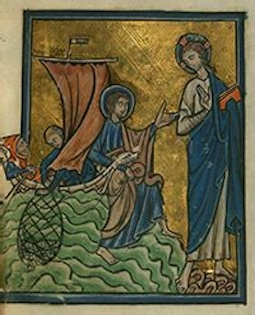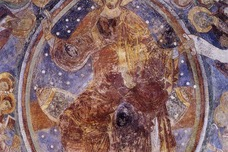Sunday Reflection with Canon Robin Gibbons: 4 May 2025

William de Brailes - Christ Appears at Lake Tiberias - Wiki image
Third Sunday of Easter
In this intermediate period for the Church, when having bid adieu to Pope Francis and remember him in the official period of mourning, we are also anticipating the election of his successor as bishop of Rome, our hopes placed in the hand of a small number of cardinal electors.
As is so very frequent in this age of mass communication, there are numerous attempts in our various forms of media, to identify possible 'papabile', but I am reminded that most of this is simply guess work, and in the end we have to trust in the role of the Holy Spirit to guide those immediately involved in the conclave.
Yet, despite this moment in our history, the Risen Lord reminds us that we are all involved in ministry and mission, and helps us carry on being Church, the death of a pope does not mean that everything grinds to a halt, in fact it reminds us of the mission of Peter given to us all, to be lovers of Christ and the flock he calls his own.
John's gospel this third Sunday of Easter provides a powerful mediation on just what it means for each one of us to be a disciple of the Lord, and rather neatly it divides up into two main points centring on Peter's understanding of and response to Jesus. The first part takes us into the strange world of the disciples after the resurrection, before they meet the risen Christ, here they are back in their normal work as fishermen and it is in this context of their work that they meet the Lord. This should not seem strange to us, as this is how we too find him, in the daily routine of our lives, in the ordinary, not the extraordinary. You might wonder how our encounters with Christ mirror this gospel story, perhaps the best clue is in these few sentences:
'When it was already dawn, Jesus was standing on the shore; but the disciples did not realize that it was Jesus. Jesus said to them, "Children, have you caught anything to eat?" They answered him, "No."So he said to them, "Cast the net over the right side of the boat and you will find something."'(Jn 21:4-6)
The point is that we too, busy about our daily work, do not often recognise the various encounters with Jesus given us, yet we should remind ourselves he is with us always and notice that in this encounter we are being shown that it is he who makes the first move, by calling out to us to notice something. We cannot replicate this story but we can learn from it and remind ourselves that the presence of Christ comes in many ways, mostly, though not exclusively, through meetings with others. As Christians, in our Catholic tradition, we are taught to discern the various presences of Christ, the first of these is in our neighbour, but in order to really understand that we rely on the presence of Christ the Word, we need to be attentive to his call, to learn to listen to the promptings of the Spirit given to us in order that we might have that correct insight. The fact that Jesus asks the disciples if they have caught anything to eat is a distinct reminder that nourishment is key to our life of faith, for the body as well as the soul, but it's more, for the wider context of eating, is for us a communal act of sharing, especially when we share the eucharistic gifts in communion. We are called by Christ not to let others go hungry in any way!
How do we know Christ is calling us? All I can suggest is that if you are committed to following the gospel way, then you will discover Our Dear Lord present to you, even without really knowing he is there until something allows you to recognise him. That is the hidden side of our own faith, we have to trust in his promise and the Spirit's gift, but also to understand what we can find in the second part of this gospel that being called by Jesus, means learning the language of the heart, the language of charity and love. For as we are reminded by that beautiful chant sung at the mandatum, the washing of the feet on Holy Thursday; 'Ubi caritas et amor, Deus ibi est', perhaps best translated as 'Where there is charity and love, God is there'!
This love is the key, a love that is multi layered, but always grounded in service of others, and not only humans, for God's presence is found in all life, all times and all places. This is the Petrine commission which belongs to us all, and which each Pope in his ministry encourages us to undertake fearlessly. The threefold question and command given by Jesus to Peter is an echo of his betrayal of his master, a denial done three times but now forgiven. A greater reminder to us all that though we are sinners, that fact should not hold us back from loving as Christ has commanded. Notice carefully that the directive given by Jesus to Peter and by connection also to us, is clear, as a response to loving him we are called to ministry, we too are to feed the lambs, tend the sheep and then feed them also. This is important for it makes a distinction between those who are young or are new to faith, they need the nourishment from capable, committed and good spiritual guides and friends, whilst the more experienced need looking after and feeding in a different way, with a greater and gentler care. May this also be our way!
Lectio
John Chrysostom
Homily 88
So when they had dined, Jesus says to Simon Peter, Simon, son of Jonas, do you love Me more than these? He says unto Him, Yea, Lord, You know that I love You.
1. There are indeed many other things which are able to give us boldness towards God, and to show us bright and approved, but that which most of all brings good will from on high, is tender care for our neighbour. Which therefore Christ requires of Peter. For when their eating was ended, Jesus says to Simon Peter, Simon, son of Jonas, do you love Me more than these? He says unto Him, Yea, Lord, You know that I love You.
He says unto him, Feed My sheep.
And why, having passed by the others, does He speak with Peter on these matters? He was the chosen one of the Apostles, the mouth of the disciples, the leader of the band; on this account also Paul went up upon a time to enquire of him rather than the others. And at the same time to show him that he must now be of good cheer, since the denial was done away, Jesus puts into his hands the chief authority among the brethren; and He brings not forward the denial, nor reproaches him with what had taken place, but says, If you love Me, preside over your brethren, and the warm love which you ever manifested, and in which you rejoiced, show thou now; and the life which you said you would lay down for Me, now give for My sheep.
Ubi Caritas
Where charity and love are found, there is God. The love of Christ has gathered us together into one. Let us rejoice and be glad in him. Let us fear and love the living God, and love each other from the depths of our heart.
Where charity and love are found, there is God. Therefore when we are together, let us take heed not be divided in mind. Let there be an end to bitterness and quarrels, an end to strife, and in our midst be Christ our God.
Where charity and love are found, there is God. And, in company with the blessed, may we see your face in glory, Christ our God, pure and unbounded joy for ever and for ever.


















